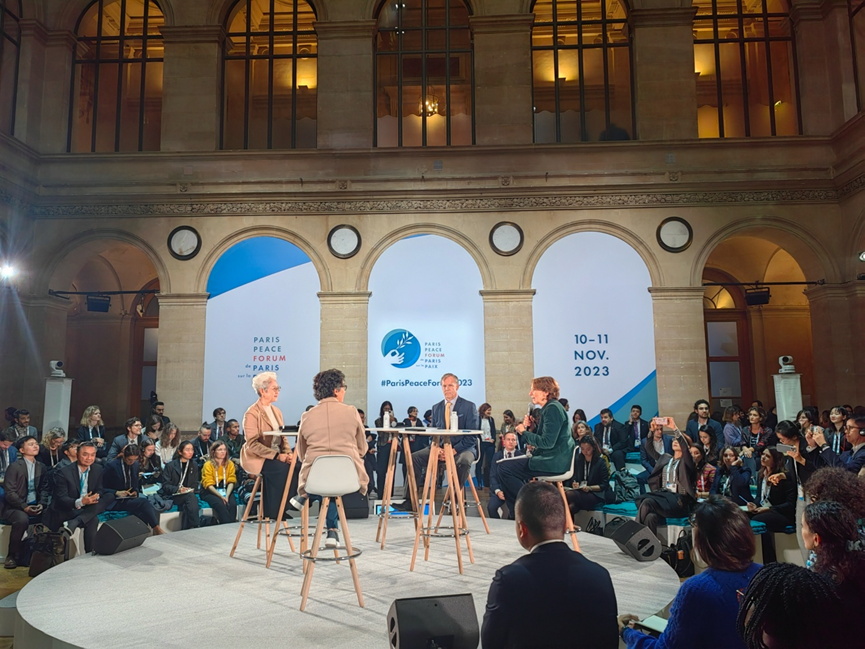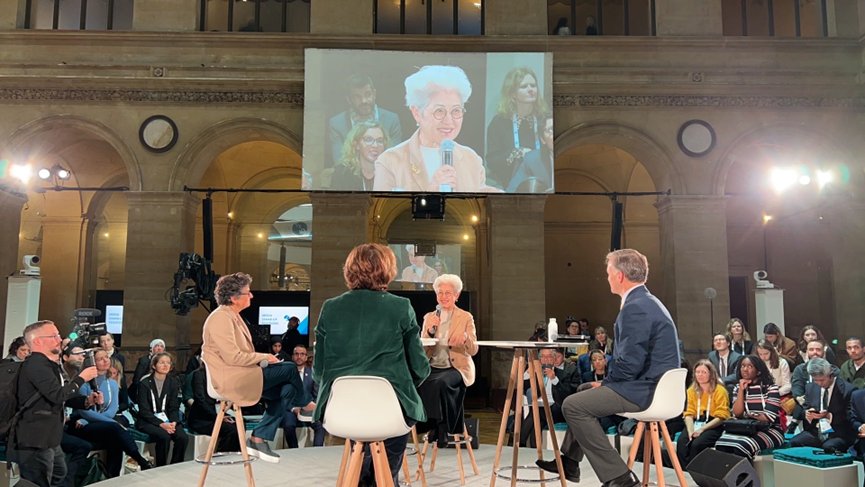On November 10, 2023, the 6th Paris Peace Forum was held at Palais Brongniart in Paris, France. French President Emmanuel Macron attended the opening ceremony and delivered a speech.
Fu Ying, former Chinese Ambassador to the United Kingdom, attended the Forum and spoke at a sub-forum under the theme of “Seeking Common Ground in a World of Rivalry.” Fu mainly responded to the topics raised at the Forum on the challenges of multipolarity and multilateralism and China-U.S. relations and exchanged views with participating scholars from various countries on current international hotspot issues.

When talking about the trend of world multipolarity, the lack of consensus on multilateralism, and the weakening of multilateral mechanisms, Fu Ying said that the U.S. has tried to take full control of international affairs after the Cold War and that it has committed itself to the political transformation of other countries, which has seriously overdrawn its own national power and led to the accumulation of domestic contradictions. At the same time, economic globalization has diluted international hegemony, and the U.S.’s dominance over world affairs has been weakened. The U.S.’s commitment to world affairs and sense of responsibility are declining. It highlights geopolitics and promotes competition and confrontation among major powers, making it difficult for many multilateral institutions to play an effective role in governance. In her view, the U.S.’s international strategic adjustments have exerted a negative impact on economic globalization and multilateralism. On the one hand, it has accelerated the decline of economic globalization, thereby basically concluding the era of rapid global economic growth following the Cold War. On the other hand, it has also seriously undermined multilateralism and international cooperation.
She spoke of the inevitable trend towards the waning hegemony and the rising multipolar power as hegemonic powers abandon the global vision. The ultimate question to be considered is not only how to define power structures, but how to prevent the world from being thrown into chaos by the lack of effective governance as the unipolarity weakens and the multipolarity rises. It’s necessary to consider how to do a good job of global governance so that humanity can work together to deal with such things as climate change and potential threats in the development of artificial technology (AI) high technology. In Fu’s speech, China doesn’t want to compete with the U.S. for power; nor does it have the intention of becoming a new world hegemon. China pursues peaceful development and advocates multilateralism and the building of a community with a shared future. The core of three major initiatives on global development, security, and civilization, proposed by Chinese President Xi Jinping, is to maintain peace and promote development through cooperation.
On the question of how to view the competition between China and the U.S., Fu Ying emphasized that China does not favor zero-sum competition but advocates mutually beneficial cooperation. The U.S. aims to prevent China from continuing development, fearing that its international power will be replaced. This is not because China has any policies or actions that challenge the U.S., but because its inherent hegemonic nature that does not allow any country to surpass itself is at play. Over the years, China’s economy and foreign cooperation have demonstrated resilience and have shown China’s attitude. China resists labeling the China-US relationship as mere “competition” and rejects the notion of “strategic competition,” and China has no intention of allowing such competition to dominate the entire 21st century, Fu said.
Fu Ying believed that China and the U.S. should stabilize bilateral relations, or, at the very least, distinguish their differences from shared interests. The two countries should peacefully coexist in one world and avoid falling into the narrative strategy of “competition.” In her speech, China firmly believes that the 21st century should be characterized by peaceful development and that all nations must learn to coexist and collaborate to build a shared future for humanity within the context of multipolarity. She also hoped that for Europe and the broader global community, it is imperative to take on the role of a third-party mediator to prevent further global division and ensure that international governance keeps pace with scientific, technological, and societal advancements against the backdrop of the competition between great powers.
When it came to the regulation and governance of AI technology, Fu Ying held that both China and the U.S. are obligated to work together to ensure the safety of AI technology. If one side targets or attacks the other with the technology it possesses, the technology development will be riskier.
In terms of the Global South, Fu Ying said that China has always been a member of the Global South, and there is no leadership competition issue. Leadership depends on the ability to provide public goods. Countries in the Global South have different concerns about different topics and should play to their respective strengths under the complex agenda and work closely together for common development.
On the question of China’s position and role in the Israeli-Palestinian conflict raised by the audience, Fu Ying argued that China condemns any behavior that harms civilians and believes that it’s imperative for the Israeli-Palestinian conflict to cease fire and stop the war as soon as possible, without continuing to expand the humanitarian catastrophe. China insists that the fundamental way out of the conflict is to implement the “two-state solution,” establish an independent Palestinian state, and achieve a peaceful coexistence between Palestine and Israel.
Fu Ying pointed out that the spread of the Israeli-Palestinian conflict also reflects the lack of multilateralism in today’s world and the need for multi-party participation in promoting conflict resolution. According to her speech, China attaches importance to the role of the relevant regions and countries in resolving the conflict and supports their efforts to provide humanitarian relief corridors. China hopes that all parties will play a joint role and that the Middle East region will maintain its momentum of development.

The “Seeking Common Ground in a World of Rivalry” sub-forum was moderated by Sylvie Kauffmann, Editor-in-Chief of Le Monde. The sub-forum was joined by Arancha González Laya, Dean of the Paris School of International Affairs at Sciences Po, and Stewart Patrick, Director of the Global Order and Institutions Program at the Carnegie Endowment for International Peace. The sub-forum focused on the fact that in today’s world, against the backdrop of intensifying competition between China and the U.S., conflict, climate change, and epidemic aftermath linger and have serious repercussions for the world’s vulnerable states. Therefore, there is an urgent need for the international community to find common ground on the governance of the global commons and global public goods, work together to defend collective interests, and prevent divisions from leading to a point of no return. Focusing on discussing how to promote responsible geopolitical dialogues among different types of actors, participants shared their visions of the world and the future of global governance to seek solutions for reaching a consensus, in order to effectively respond to the pressing challenges in the current era.
Other participating scholars believed that China and the U.S. should set aside conflicts, establish basic principles on how to manage differences on specific issues, and seek consensus on how to govern climate change, AI safety, and other topics. They should join hands to advance the global agenda, maintain peace and stability in the world, and avoid moving toward division. They held that if the conflicts between China and the U.S. intensify, it would be harmful to the two countries, to Europe, and even to the world. For example, the two powers would be too busy competing to deal with regional conflicts such as the Israeli-Palestinian conflict and the Sudanese issue. On the topic of AI safety, if China and the U.S. do not reach a consensus, it will be unlikely to form a global consensus on a universal basis, and the lack of such a technological consensus may lead to a global split in information, finance, trade, economic growth, and other areas.
At the Paris Peace Forum, scholars from various countries generally looked forward to stable relations between China and the U.S. in the near future. They emphasized China’s role in global governance and in resolving regional conflicts, believing that stakeholders alone cannot truly solve problems and expecting that China can play a greater role in the Israeli-Palestinian conflict.
